译林版小学英语六年级上册知识点(全)
六上英语译林版知识点汇总

六上英语译林版知识点汇总
一、词汇
1. 四会单词:学生需要掌握四会单词,即会听、说、读、写。
这些单词包括常用的名词、动词、形容词、副词等。
2. 习惯用语:学生需要掌握一些常见的习惯用语,如问候、道别、感谢、道歉等常用表达方式。
二、语法
1. 现在进行时:学生需要掌握现在进行时的构成和用法,如“I am doing my homework now.”等。
2. 一般现在时:学生需要掌握一般现在时的构成和用法,如“I usually get up at 7 o’clock every day.”等。
3. 一般过去时:学生需要掌握一般过去时的构成和用法,如“She went to the park last weekend.”等。
三、语音
学生需要掌握元音字母及常见字母组合的发音,如“ea”、“ai”、“ay”等。
此外,还需要了解重音和语调的规则。
四、句型
学生需要掌握陈述句、疑问句和祈使句的构成和用法,如“I have a new friend.”、“Do you like apples?”和“Please sit down.”等。
五、情景交际
学生需要在不同的情境中运用所学句型进行交流,如购物、问
路、打电话等。
此外,还需要了解不同国家的文化和习惯用语。
新译林版六年级上册英语知识点归纳总结
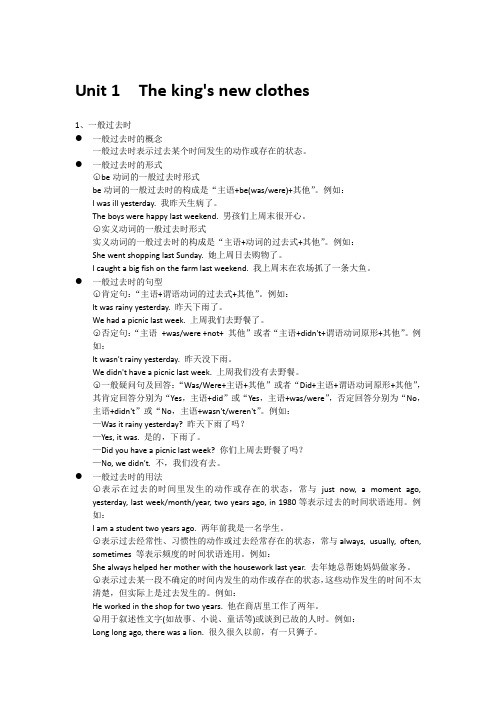
Unit 1 The king's new clothes1、一般过去时●一般过去时的概念一般过去时表示过去某个时间发生的动作或存在的状态。
●一般过去时的形式○1be动词的一般过去时形式be动词的一般过去时的构成是“主语+be(was/were)+其他”。
例如:I was ill yesterday. 我昨天生病了。
The boys were happy last weekend. 男孩们上周末很开心。
○2实义动词的一般过去时形式实义动词的一般过去时的构成是“主语+动词的过去式+其他”。
例如:She went shopping last Sunday. 她上周日去购物了。
I caught a big fish on the farm last weekend. 我上周末在农场抓了一条大鱼。
●一般过去时的句型○1肯定句:“主语+谓语动词的过去式+其他”。
例如:It was rainy yesterday. 昨天下雨了。
We had a picnic last week. 上周我们去野餐了。
○2否定句:“主语+was/were +not+ 其他”或者“主语+didn't+谓语动词原形+其他”。
例如:It wasn't rainy yesterday. 昨天没下雨。
We didn't have a picnic last week. 上周我们没有去野餐。
○3一般疑问句及回答:“Was/Were+主语+其他”或者“Did+主语+谓语动词原形+其他”,其肯定回答分别为“Yes,主语+did”或“Yes,主语+was/were”,否定回答分别为“No,主语+didn't”或“No,主语+wasn't/weren't”。
例如:—Was it rainy yesterday? 昨天下雨了吗?—Yes, it was. 是的,下雨了。
—Did you have a picnic last week? 你们上周去野餐了吗?—No, we didn't. 不,我们没有去。
六年级译林版英语上册

六年级译林版英语上册一、单词部分。
1. 重点单词汇总。
- Unit 1 The king's new clothes.- clothes:衣服,是复数形式,没有单数形式的表达,例如:These clothes are beautiful.(这些衣服很漂亮。
)- king:国王,例如:The king is very rich.(这个国王非常富有。
)- foolish:愚蠢的,例如:Don't be so foolish.(不要如此愚蠢。
)- point at:指着,例如:Don't point at others.(不要指着别人。
)- Unit 2 What a day!- cloudy:多云的,是形容词,用来描述天气,例如:It's cloudy today.(今天多云。
)- rainy:下雨的,例如:We can't go out on a rainy day.(下雨天我们不能出去。
)- sunny:晴朗的,例如:It was sunny yesterday.(昨天天气晴朗。
)- windy:有风的,例如:It's windy in spring.(春天多风。
)- Unit 3 Holiday fun.- holiday:假期,例如:I had a great holiday.(我度过了一个很棒的假期。
)- fun:乐趣,例如:We had a lot of fun at the party.(我们在聚会上玩得很开心。
)- visited(visit的过去式):参观,拜访,例如:I visited my grandparents last week.(我上周拜访了我的祖父母。
)- Unit 4 Then and now.- ago:以前,例如:I lived in a small village five years ago.(五年前我住在一个小村庄。
译林版六年级上册英语知识点归纳
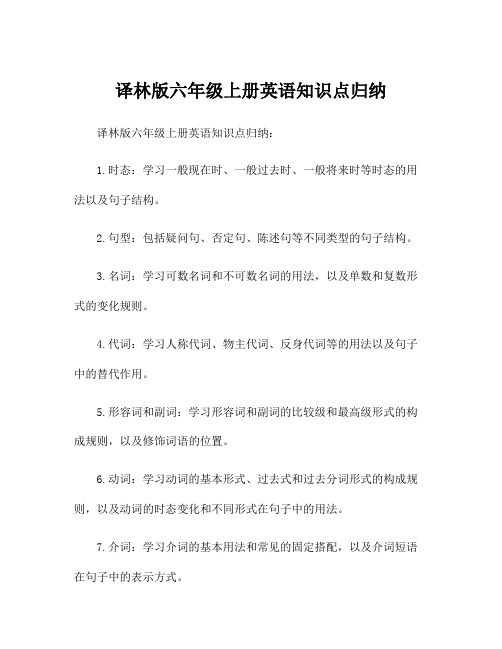
译林版六年级上册英语知识点归纳译林版六年级上册英语知识点归纳:1.时态:学习一般现在时、一般过去时、一般将来时等时态的用法以及句子结构。
2.句型:包括疑问句、否定句、陈述句等不同类型的句子结构。
3.名词:学习可数名词和不可数名词的用法,以及单数和复数形式的变化规则。
4.代词:学习人称代词、物主代词、反身代词等的用法以及句子中的替代作用。
5.形容词和副词:学习形容词和副词的比较级和最高级形式的构成规则,以及修饰词语的位置。
6.动词:学习动词的基本形式、过去式和过去分词形式的构成规则,以及动词的时态变化和不同形式在句子中的用法。
7.介词:学习介词的基本用法和常见的固定搭配,以及介词短语在句子中的表示方式。
8.冠词:学习"a"、"an"和"the"的用法和区别,以及冠词与其他词类的搭配。
9.数词:学习基数词、序数词和分数的表达方式及用法。
10.并列连词:学习并列连词的用法和表示方式,如"and"、"but"、"or"等。
11.程度副词:学习表示程度或强调的副词,如"very"、"too"、"so"等。
12.物体和物品:学习常见的物体和物品的名称,以及它们的形状、颜色、尺寸等特征描述。
13.动物、植物和自然界:学习不同种类的动物、植物和自然界的名称及特征描述。
14.基本日常生活用语:学习常见的日常用语,如问候、道谢、表达喜欢和不喜欢等。
15.时间、日期和季节:学习表示时间、日期和季节的词汇与句型。
16.地点和方位:学习表示地点和方位的词汇,如家、学校、街道、方向等。
17.格言和谚语:学习一些常见的格言和谚语,了解其中的含义和用法。
18.文化习俗和节日传统:学习不同国家或民族的文化习俗和节日传统,了解和欣赏多元文化。
以上是译林版六年级上册英语的知识点归纳,希望可以准确回答您的问题。
译林版小学六年级上册英语全册各单元短语句型大全总结
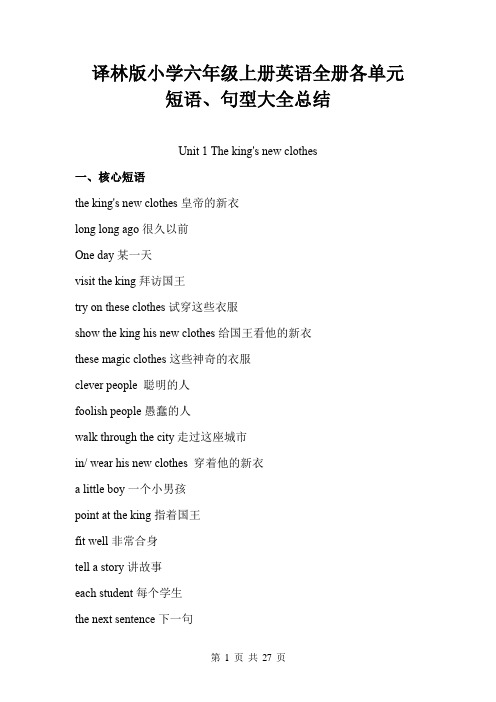
译林版小学六年级上册英语全册各单元短语、句型大全总结Unit 1 The king's new clothes一、核心短语the king's new clothes皇帝的新衣long long ago很久以前One day某一天visit the king拜访国王try on these clothes试穿这些衣服show the king his new clothes给国王看他的新衣these magic clothes这些神奇的衣服clever people 聪明的人foolish people愚蠢的人walk through the city走过这座城市in/ wear his new clothes 穿着他的新衣a little boy一个小男孩point at the king指着国王fit well非常合身tell a story讲故事each student每个学生the next sentence下一句think hard努力地想have to不得不in front of the house在房子前面;walk by the house步行经过房子shout at the old man对着老人大喊give me your child 把你的孩子给我be nice to her对她很好look after him照顾他turn into a prince变成王子二、重点句型1. My king, we can make new clothes for you.我的国王,我们可以给您做新衣服。
【解析】can为情态动词,后面跟动词原形;“make sth.for sb."意为“为某人制作某物",for为介词,后面如果跟人称代词需要用其宾格形式。
My mother can make dresses for me.我妈妈可以给我做连衣裙。
They are making a birthday cake for Su Hai.他们正在为苏海制作一个生日蛋糕。
六年级英语上册译林

六年级英语上册译林一、重点单词。
1. 月份类。
- January(一月),February(二月),March(三月),April(四月),May (五月),June(六月),July(七月),August(八月),September(九月),October(十月),November(十一月),December(十二月)。
- 记忆方法:可以按照顺序编成口诀,如“January February,新年刚过忙三月(March)”等,也可以通过制作单词卡片,一面写单词,一面写中文释义和简单的月份特点(如January有新年等)来记忆。
2. 节日类。
- New Year's Day(元旦),Chinese New Year(春节),Mid - Autumn Festival(中秋节),Dragon Boat Festival(端午节)等。
- 对于节日类单词,可以结合节日的文化习俗来记忆。
例如,对于Dragon Boat Festival,可以联想龙舟比赛、吃粽子等习俗,这样能更好地记住单词。
3. 日常活动类。
- have breakfast(吃早饭),have lunch(吃午饭),have dinner(吃晚饭),go to school(去上学),go to bed(去睡觉),get up(起床)等。
- 可以通过模拟日常场景对话来练习这些单词的使用。
比如和同学互相问答:“What time do you get up?”“I get up at six o'clock.”二、重点句型。
1. 询问日期。
- What date is it today? It is + 日期(如the first of June)。
- 在练习这个句型时,可以制作一个简单的日历,每天互相询问日期,加深印象。
2. 询问节日。
- What festival is in + 月份?- 例如:What festival is in January? There is New Year's Day in January.3. 日常活动时间安排。
(完整word版)译林版六年级上册知识点梳理
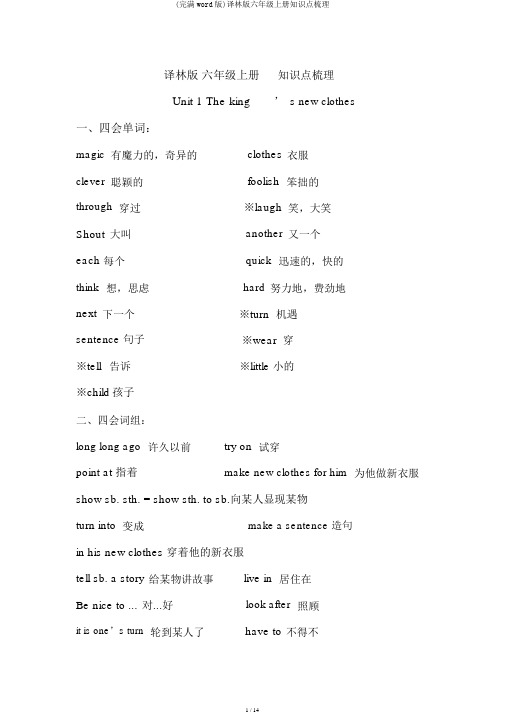
译林版六年级上册知识点梳理Unit 1 The king’ s new clothes一、四会单词:magic有魔力的,奇异的clothes衣服clever聪颖的foolish笨拙的through穿过※laugh笑,大笑Shout大叫another又一个each每个quick迅速的,快的think想,思虑hard努力地,费劲地next下一个※turn机遇sentence 句子※wear穿※tell告诉※little 小的※child孩子二、四会词组:long long ago许久以前try on试穿point at 指着make new clothes for him为他做新衣服show sb. sth. = show sth. to sb.向某人显现某物turn into变成make a sentence 造句in his new clothes 穿着他的新衣服tell sb. a story给某物讲故事live in居住在Be nice to ...对...好look after照顾it is one’s turn轮到某人了have to不得不in front of在...前面walk by经过think hard努力地思虑shout at sb. 对某人大叫三.重点句型:1.Long long ago, there was a king. 许久许久以前,有一个国王。
2.Two men visited the king. 两个男人来拜会国王。
3.We can make new clothes for you. 我们能够为你做新衣服。
4.The two men showed the king his new clothes. 这两个人向国王显现了他的新衣服。
5.The king walked through the city in his new clothes. 国王穿着他的新衣服步行穿过城市。
(完整word版)苏教版译林版英语六年级上册复习知识点汇总

苏教版译林版英语六年级上册知识点汇总Unit 1 The king’s new clothes一,单词/词组1. long long ago 很久以前2. new clothes 新衣服3. make new clothes for you 为你制作新衣服make sth for sb4. show the king his new clothes给皇帝展示新衣服show sb. sth.= show sth. to sb.5.try on 试穿try on the coat=try the coat on try it/them6. magic clothes 有魔力的衣服7. walk through步行穿过8. in his new clothes 穿着他的新衣服9. shout at sb. 对某人大叫10. laugh at sb. 对某人大笑11. look at 看….12. point at 指向…13. fit well 非常适合14. an American cowboy 一个美国牛仔15. a Scottish man 一位苏格兰人16. tell a story 讲一个故事17. say a/one sentence 说一句话18. on the mountain 在山上19. the next sentence 下一句话20. live in the house 住在房子里21. tell the boy a story 给这个男孩讲一个故事tell sb. sth.22. it is one’s turn 某人的机会23. think hard 努力思考24. have to 不得不have to do sth.25. in front of 在….前面(外部)in the front of 在… 前面(内部)26. walk by 路过27. be nice to sb. 对某人好28. look after 照顾29. turn into 变成二,句型1. Long long ago, there was a king. 很久很久以前,有一位国王。
译林英语六年级上册全册重难点知识点梳理
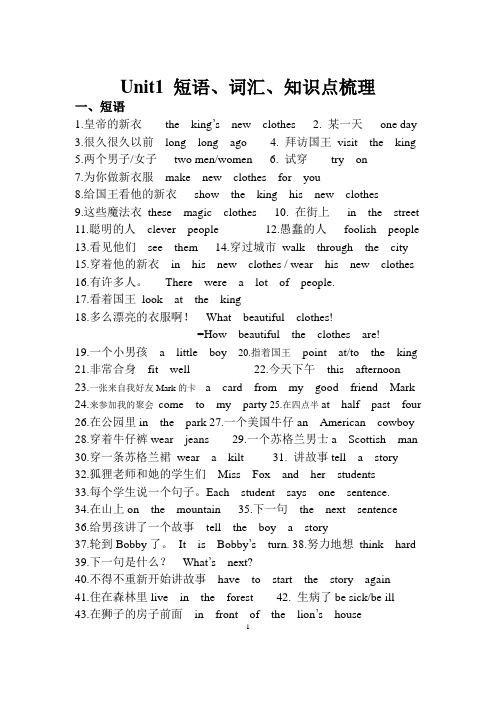
Unit1 短语、词汇、知识点梳理一、短语1.皇帝的新衣the king’s new clothes2. 某一天one day3.很久很久以前long long ago4. 拜访国王visit the king5.两个男子/女子two men/women6. 试穿try on7.为你做新衣服make new clothes for you8.给国王看他的新衣show the king his new clothes9.这些魔法衣these magic clothes 10. 在街上in the street 11.聪明的人clever people 12.愚蠢的人foolish people 13.看见他们see them 14.穿过城市walk through the city15.穿着他的新衣in his new clothes / wear his new clothes16.有许多人。
There were a lot of people.17.看着国王look at the king18.多么漂亮的衣服啊!What beautiful clothes!=How beautiful the clothes are!19.一个小男孩 a little boy 20.指着国王point at/to the king 21.非常合身fit well 22.今天下午this afternoon23.一张来自我好友Mark的卡 a card from my good friend Mark24.来参加我的聚会come to my party 25.在四点半at half past four 26.在公园里in the park 27.一个美国牛仔an American cowboy 28.穿着牛仔裤wear jeans 29.一个苏格兰男士a Scottish man 30.穿一条苏格兰裙wear a kilt 31. 讲故事tell a story32.狐狸老师和她的学生们Miss Fox and her students33.每个学生说一个句子。
六年级上册英语教材译林版
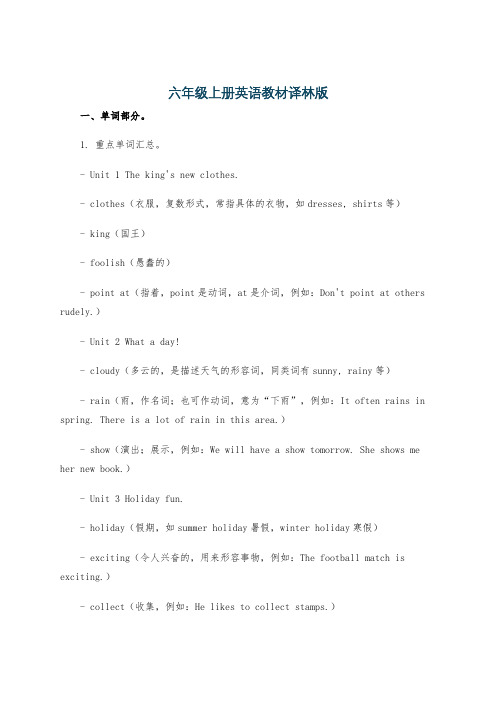
六年级上册英语教材译林版一、单词部分。
1. 重点单词汇总。
- Unit 1 The king's new clothes.- clothes(衣服,复数形式,常指具体的衣物,如dresses, shirts等)- king(国王)- foolish(愚蠢的)- point at(指着,point是动词,at是介词,例如:Don't point at others rudely.)- Unit 2 What a day!- cloudy(多云的,是描述天气的形容词,同类词有sunny, rainy等)- rain(雨,作名词;也可作动词,意为“下雨”,例如:It often rains in spring. There is a lot of rain in this area.)- show(演出;展示,例如:We will have a show tomorrow. She shows me her new book.)- Unit 3 Holiday fun.- holiday(假期,如summer holiday暑假,winter holiday寒假)- exciting(令人兴奋的,用来形容事物,例如:The football match is exciting.)- collect(收集,例如:He likes to collect stamps.)2. 单词记忆方法。
- 联想法。
- 对于“foolish”这个单词,可以联想一个傻瓜(fool)做出了很傻的(foolish)事情。
比如一个人在下雨天不带伞还在雨中跳舞,看起来很foolish。
- 分类记忆法。
- 把描述天气的单词放在一起记忆,像“sunny(晴朗的)、cloudy、rainy(下雨的)、windy(有风的)”,可以通过回忆不同天气的情景来加深记忆。
例如,在sunny的天气可以去野餐,cloudy的时候天空有很多云等。
译林版小学英语六年级上册全册知识点梳理
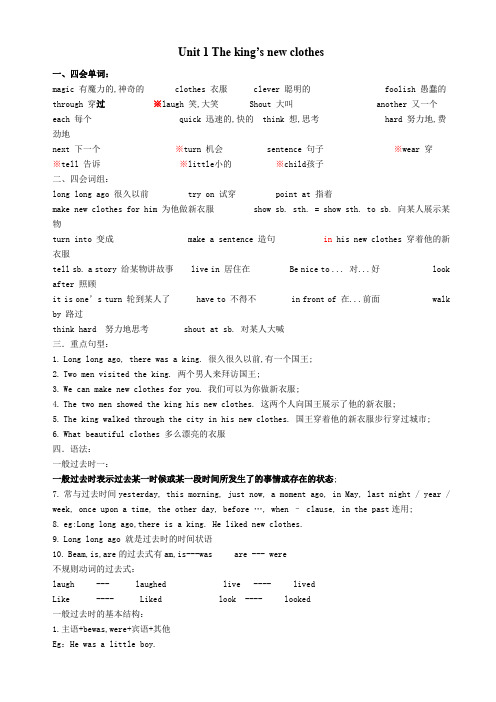
Unit 1 The king’s new clothes一、四会单词:magic 有魔力的,神奇的 clothes 衣服 clever 聪明的 foolish 愚蠢的through 穿过※laugh 笑,大笑 Shout 大叫 another 又一个each 每个 quick 迅速的,快的 think 想,思考 hard 努力地,费劲地next 下一个※turn 机会 sentence 句子※wear 穿※tell 告诉※little小的※child孩子二、四会词组:long long ago 很久以前 try on 试穿 point at 指着make new clothes for him 为他做新衣服 show sb. sth. = show sth. to sb. 向某人展示某物turn into 变成 make a sentence 造句in his new clothes 穿着他的新衣服tell sb. a story 给某物讲故事 live in 居住在 Be nice to ... 对...好 look after 照顾it is one’s turn 轮到某人了 have to 不得不 in front of 在...前面 walk by 路过think hard 努力地思考 shout at sb. 对某人大喊三.重点句型:1.Long long ago, there was a king. 很久很久以前,有一个国王;2.Two men visited the king. 两个男人来拜访国王;3.We can make new clothes for you. 我们可以为你做新衣服;4.The two men showed the king his new clothes. 这两个人向国王展示了他的新衣服;5.The king walked through the city in his new clothes. 国王穿着他的新衣服步行穿过城市;6.What beautiful clothes 多么漂亮的衣服四.语法:一般过去时一:一般过去时表示过去某一时候或某一段时间所发生了的事情或存在的状态;7.常与过去时间yesterday, this morning, just now, a moment ago, in May, last night / year / week, once upon a time, the other day, before …, when – clause, in the past连用;8.eg:Long long ago,there is a king. He liked new clothes.9.Long long ago 就是过去时的时间状语10.Beam,is,are的过去式有am,is---was are --- were不规则动词的过去式:laugh --- laughed live ---- livedLike ---- Liked look ---- looked一般过去时的基本结构:1.主语+bewas,were+宾语+其他Eg:He was a little boy.2.主语+动词的过去式+宾语+其他Eg: We brought some bread and honey to the park.Unit 2 What a day一.四会单词:※sunny 晴朗的※windy 有风的※cloudy 多云的※rainy 有雨的weather 天气※become 变成,变为honey 蜂蜜 drink 饮料※Sky 天空※bring 带来bread 面包※meet 遇见ant 蚂蚁 high 在高处※meet 遇见 know 知道cloud 云 rain 下雨lose 丢失 parrot 鹦鹉show 展览,展示 interesting 有趣的,有意思的二.重点词组:A parrot show 一场鹦鹉表演 fly kites/a kite 放风筝By bike = ride a bike 骑自行车 high in the sky 在高空中Rain all day 下了一整天的雨 well done 干得好Look sad 看起来伤心 fly away 飞走Fly high 飞得高 black clouds 乌云Become windy and cloudy 变得有风多云What happened 出什么事了climb up 爬上 hold onto 抓紧Watch a film看电影 do housework 做家务Have a picnic 野餐 on Monday morning 在星期一早上三.重点句型:1.What a day 多么糟糕的一天2.The weather became windy and cloudy. 天气变得多风且多云;3.What’s the matter with sb. = What’s wrong with sb. 某人怎么了/出什么事了四.语法:一般过去时二:不规则动词过去式:Becomebecame can could go went take tookBringbrought fly flew see saw lose lostClimb climbed happen happened find found wantwantedUnit 3 Holiday fun一.四会单词:※holiday 假日,假期 call 打电话 Bund 上海外滩star 星星※Excited 激动的※paper 纸※Ask 问※bottle 瓶子二.重点词组:Shanghai Museum 上海博物馆※Great Wall 长城※National Day 国庆节 Palace Museum 故宫Summer Palace 颐和园※At first 首先Tian‘anmen Square 天安门广场 a fashion show 一场时装秀※heavy rain 大雨 Come back to school 回到学校 the summer holiday 暑假※go well 进展顺利Pick some oranges 摘桔子 be excited about 对...感到兴奋Ask about 问关于...的情况 wear paper clothes 穿纸衣服 holiday fun 假期趣事It is time to do sth.= it is time for sth.到做某事的时间了二.重点句型:1.What did you/he do for the holiday 你/他假期做过什么2.He visited the Shanghai Museum. 他参观了上海博物馆;3.Did you go fishing 你去钓鱼了吗Yes, I did./ No, I didn’t.4.Where did you go for the holiday 你去哪儿度假的啊5.I saw many interesting things.我看到很多有趣的东西;6.How was your holiday 你的假期过得怎么样7.We picked some oranges and went fishing.我们摘了很多橘子和去钓鱼;三.语法一般过去时三不规则动词过去式Catchcaught dodid eatate getgotWearwore havehadUnit 4 Then and now一.四会单词:radio 收音机※ago ……以前use 用※watch观看telephone 电话※office 办公室※newspaper 报纸※news 新闻※e-book 电子书※with 用anywhere 随处,到处※yesterday 昨天televisionTV电视二.重点词组:read e-book 读电子书 listen to the radio 听收音机go on 继续 on the Internet 在网上Buy things from shops 从商店买东西do many things 做很多事 work hard 努力工作make friends 交朋友 all over the world 全世界do shopping 购物 look out of 朝……外看spell 拼读,拼写 make a sentence 造句then and now 过去和现在 wait for 等待mobile phone 移动电话,手机 get angry 变得生气三.重点句型1.He used the telephone at home and in the office to call people.他在家在办公室都是用座机给人们打电话;2.Mike’s grandpa listened to the radio and read newspapers for news.麦克的爷爷通过听收音机和看报纸获取新闻;3.She bought things from shops. 他从商店买东西;4.Now she has e-friends from all over the world.现在他有来自世界各地的朋友;4..What day is today今天是星期几四.语法一般过去时四不规则动词过去式:Can could get gotRead read 同音异形本课主要是一般过去时时态讲解的总结Unit 5 Signs一.四会单词:※sign标识※careful 小心,当心※mean 意思是※floor 地面litter 乱扔垃圾 restaurant餐馆someone 某人 smoke 吸烟smell 闻到 outing 外出游玩※around 在...周围二.重点词组:No eating or drinking 禁止吃喝be careful 小心,当心No littering 禁止扔垃圾want to do sth 想要做某事No parking 禁止停车go in 进入No smoking 禁止吸烟take...into...把...带进...里Danger 有危险※at a shopping center 在购物中心Wet floor 小心地滑be on an outing 远足No feeding 禁止喂食 in the forest 在森林里No walking 禁止踩踏tired and hungry 又累又饿No climbing trees 禁止爬树 look for 寻找No shouting 禁止大喊 a sign on a tree 树上的标识No swimming 禁止游泳walk on 继续走路No picking flowers 禁止摘花No fishing 禁止钓鱼三.重点句型:1.What does this sign mean 这个标识是什么意思2.It means the floor is wet.3.It is time for lunch. 到吃午饭的时间了;4.Bobby gives Sam a banana. give sb. sth.= give sth. to sb.三.语法:What does it meanIt means the floor is wet.它的意思是地滑;It means you can’t eat or drink there. 意思是你不能在那里吃喝Unit 6 Keep our city clean 一.重点单词或词组※keep 保持※clean 干净的※make 使...变得※dirty 脏的 air空气 Smoke 烟※ground 地面 rubbish 垃圾 dead死的messy 乱的 bin垃圾桶 plant种植More更多 museum博物馆 throw扔Skin果皮 slip 滑倒 fall 摔倒二.重点词组Keep our city clean 保持城市清洁the pictures of our city 我们城市的图片Make the air dirty 使空气脏Take the bus and the metro to school 乘公交和地铁去学校Walk to school 步行去学校Move some factories away from 把一些工厂移走Put rubbish in the bin 把垃圾放入垃圾桶Throw...on the ground 把...放在地面上Plant more trees 种更多的树 walk home 步行回家Well done 干得好 live in the city 住在城市Banana skin 香蕉皮 Pick up 捡起来slip on 滑倒 Go to hospital 去医院三.语法:1.What makes the air dirty 什么使空气变脏Smoke makes the air dirty. 废气使空气变脏;2.What can we do to keep our city cleanWe can take the bus and the metro to school.Unit 7 Protect the Earth 一、四会单词:Protect地球 earth地球 save节约※useful有用的※Much很多 waste浪费reuse再利用 energy能源 Most 大部分coal煤炭※oil石油※drive 开车,驾车※Wood木头※other其他的 plastic塑料glass玻璃 Project课题 poster海报gate 大门二、重点词组Come from 来自 cut down 砍伐too many 太多 save water 节约用水drink water 喝水 use water用水Every day 每天 in many places在许多地方Much water 大量的水 waste water 浪费水Save energy 节约资源 on earth在地球上A lot of energy 许多能源 make tables制作桌子Too much太多 too many 太多Be bad for 对...有害 plastic bags 塑料袋Glass bottles玻璃瓶 do a project 做课题Make a poster 制作海报 on the trees 在树上At the school gate在学校大门口 protect the Earth 保护地球三、重点句型1.We use water/plastic/wood/...to... 我们使用水,塑料,木材做...2.We should/shouldn’t...我们应该、不应该...3.In many places, there is not much water.在许多地方,没有足够的水;4.Most of our energy comes from coal and oil. 我们的大部分能源来自煤和石油;5.We should not drive so much because cars use a lot of energy. 我们不应该开车太多,因为汽车要使用许多能源;6.Too much plastic is bad for the Earth.太多的塑料对地球有害;7.We should protect the Earth and keep it clean.我们应该保护地球,让它保持干净;四、语法1.We use water/plastic/wood/...to... 我们使用水,塑料,木材做...Should/shouldn’t 应该/不应该We should use paper bags and glass bottles./save trees.We should not drive too much.Unit 8 Chinese New Year一.四会单词:※Get 收到※food 食物※Rich 富裕的※plan 计划firecrackers 爆竹 fireworks烟花二.重点词组Hong Kong 香港on Chinese New Year’s Day 在春节这天Next week 下周Chinese New Year’s Eve 大年夜,除夕Red packet 红包 lion dance 舞狮Make some cakes 做一些蛋糕 have dinner with sb.与某人吃饭Get sth from sb. 收到某人某物 at Chinese New Year 在春节The most important festival 最重要的节日Cook dumplings 煮饺子 get the red packet 收到红包After dinner 晚饭后 talk about 谈论Watch fireworks 看烟花 in the kitchen 在厨房里三.重点句型1.Chinese New Year is coming.春节就要到了;2.Suhai gets an email from her e-friend Anna in Hong Kong.苏海收到了她来自香港的网友的邮件;3.On Chinese New Year’s Eve,we’re going to have dinner with my grandparents,my aunt and uncle and my cousin. 在除夕夜,我们将和我的爷爷奶奶,叔叔阿姨和表姐一起吃年夜饭;4.On Chinese New Year’s Day,my parents are going to give me red packets.在新年这天,我的父母将要给我红包;5.What are you going to do at Chinese New Year 你春节将要做什么四.语法一般将来时:Be going to 结构,后面接动词原形,表示“将要做某事”常常与时间状语:tomorrow,next week等;1.用来表示按照计划或安排要发生的动作,有“准备,打算”的意思;这种主观意图,一般已做过事先安排,故其实现的可能性较大,其主语常常是人;eg: We are going to have a class meeting this afternoon. 今天下午我们打算开班会2.表示根据现有情况、某种迹象,判断将要或即将发生的动作;此时不含有主观意图,只是表示说话人对客观事态发展的判断或推测,此时主语可以是人,也可以是物;eg: It is going to be Chinese New Year next week.3.Be coming 表示“即将到来”,也有将来之意Eg:Chinese New Year is coming. 春节即将来临;He is coming. 他马上就来;。
译林版六年级上册英语语法汇总
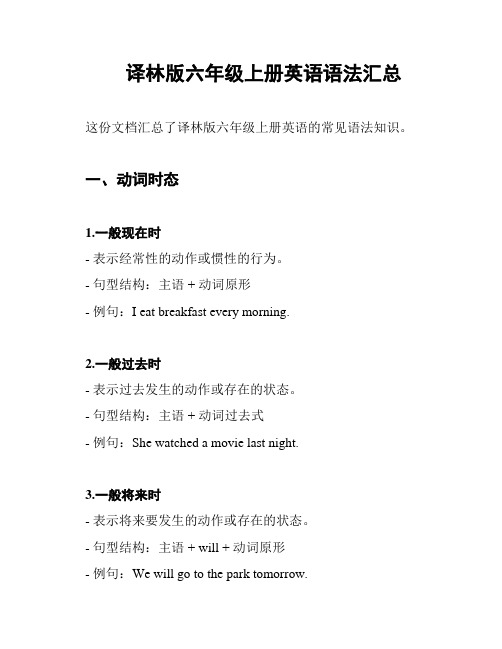
译林版六年级上册英语语法汇总这份文档汇总了译林版六年级上册英语的常见语法知识。
一、动词时态1.一般现在时- 表示经常性的动作或惯性的行为。
- 句型结构:主语 + 动词原形- 例句:I eat breakfast every morning.2.一般过去时- 表示过去发生的动作或存在的状态。
- 句型结构:主语 + 动词过去式- 例句:She watched a movie last night.3.一般将来时- 表示将来要发生的动作或存在的状态。
- 句型结构:主语 + will + 动词原形- 例句:We will go to the park tomorrow.二、名词的单复数1.可数名词的单复数- 可数名词表示可以计数的事物,有单数和复数形式。
- 例句:I have two dogs.2.不可数名词- 不可数名词表示不可计数的事物,只有单数形式。
- 例句:I have some milk.三、形容词的比较级与最高级1.比较级的形成- 在形容词后加-er,或在前面加more。
- 例句:She is taller than her sister. / He is more intelligent than his classmates.2.最高级的形成- 在形容词后加-est,或在前面加the most。
- 例句:He is the tallest boy in the class. / She is the most beautiful girl I have ever seen.四、副词的用法- 副词是用来修饰动词、形容词或其他副词的词语。
- 例句:He runs fast. / She sings beautifully.以上是译林版六年级上册英语的语法汇总,希望对你的学习有所帮助!。
江苏译林版英语六年级(上册)知识总结与归纳
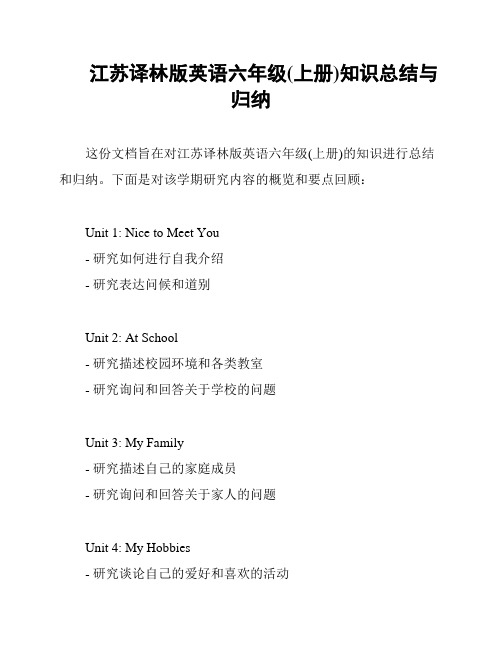
江苏译林版英语六年级(上册)知识总结与
归纳
这份文档旨在对江苏译林版英语六年级(上册)的知识进行总结和归纳。
下面是对该学期研究内容的概览和要点回顾:
Unit 1: Nice to Meet You
- 研究如何进行自我介绍
- 研究表达问候和道别
Unit 2: At School
- 研究描述校园环境和各类教室
- 研究询问和回答关于学校的问题
Unit 3: My Family
- 研究描述自己的家庭成员
- 研究询问和回答关于家人的问题
Unit 4: My Hobbies
- 研究谈论自己的爱好和喜欢的活动
- 研究询问和回答关于兴趣爱好的问题
Unit 5: Food and Drinks
- 研究讨论食物和饮料
- 研究询问和回答关于喜欢和不喜欢的食物的问题
Unit 6: At the Zoo
- 研究描绘动物和它们的性
- 研究询问和回答关于动物园的问题
Unit 7: My Week
- 研究描述一周中的活动和日程安排
- 研究询问和回答关于日程安排的问题
总结以上内容,六年级上册的研究内容围绕自我介绍、学校、家庭、爱好、食物、动物以及时间安排展开。
通过这些研究,学生们能够提高英语口语表达能力,并且了解更多有关这些主题的词汇和句型。
希望这份文档对大家有所帮助!
(字数:204字)。
(完整)英语译林(牛津)版英语六年级上册知识点整理,推荐文档

6A Unit 1 The king 's new clothes 姓名:一,单词/词组1. long long ago 很久以前2. new clothes 新衣服3. make new clothes for you 为你制作新衣服make sth for sb4. show the king his new clothes 给皇帝展示新衣服show sb. sth.= show sth. to sb.5. try on 试穿try on the coat=try the coat ontry it/them on6. magic clothes 有魔力的衣服7. walk through 步行穿过8. in his new clothes 穿着他的新衣服9. shout at sb. 对某人大叫10. laugh at sb. 对某人大笑11. look at 看….12. poi nt at 指向…13. fit well 非常适合14. an American cowboy 一个美国牛仔15. a Scottish man 一位苏格兰人16. tell a story 讲一个故事17. say a/one sentenc说一句话18. on the moun tai n 在山上19. the next sentence 下一句话20. live in the house 住在房子里21. tell the boy a story给这个男孩讲一个故事tell sb. sth.22. it is one ' s tu某人的机会23. th ink hard 努力思考24. have to 不得不have to do sth.25. in front of 在… .前面(外部)in the front of26. w alk by 路过27. be nice to sb.29. turn into在…前面(内部)对某人好变成二,句型1. Long long ago, therewas a ki ng. 很久很久以前,有一位国王。
六上知识点归纳译林英语

六上知识点归纳译林英语一、语法知识点1. 现在进行时:表示现在正在进行的动作或存在的状态。
例句:I am watching TV now.(我正在看电视。
)2. 一般现在时:表示经常性的动作或客观事实。
例句:The sun rises in the east.(太阳从东方升起。
)3. 一般过去时:表示过去发生的动作或存在的状态。
例句:She played basketball yesterday.(昨天她打篮球。
)4. 动词的ing形式:在动词后面加-ing,表示进行或进行中的动作。
例句:He is playing football in the park.(他正在公园踢足球。
)5. 人称代词:用来代替特定的人或事物,例如I, you, he, she, it, we, they。
例句:Mary is my friend. She is very kind.(玛丽是我的朋友。
她很友善。
)6. 物主代词:用来表示所属关系,例如my, your, his, her, its, our, their。
例句:This is my book.(这是我的书。
)二、词汇知识点1. 天气:sunny(晴朗的)、windy(有风的)、cloudy(多云的)、rainy(多雨的)、snowy(多雪的)例句:It's sunny today.(今天是晴天。
)2. 颜色:red(红色)、yellow(黄色)、blue(蓝色)、green(绿色)、orange(橙色)、purple(紫色)、black(黑色)、white(白色)例句:I like the red car.(我喜欢那辆红色的车。
)3. 动物:tiger(老虎)、elephant(大象)、panda(熊猫)、lion(狮子)、monkey (猴子)、bird(鸟)、rabbit(兔子)、dog(狗)、cat(猫)例句:The panda is eating bamboo.(熊猫在吃竹子。
译林版小学英语六年级上册重点知识点必知必会必背
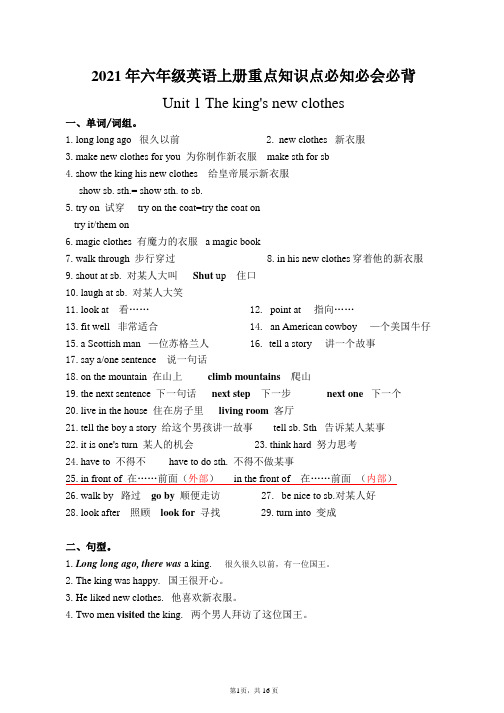
2021年六年级英语上册重点知识点必知必会必背Unit 1 The king's new clothes一、单词/词组。
1.long long ago 很久以前2. new clothes 新衣服3.make new clothes for you为你制作新衣服make sth for sb4.show the king his new clothes给皇帝展示新衣服show sb. sth.= show sth. to sb.5.try on试穿 try on the coat=try the coat ontry it/them on6.magic clothes有魔力的衣服 a magic book7.walk through步行穿过 8.in his new clothes穿着他的新衣服9.shout at sb. 对某人大叫Shut up住口ugh at sb. 对某人大笑11.look at看…… 12. point at 指向……13.fit well 非常适合 14. an American cowboy —个美国牛仔15.a Scottish man —位苏格兰人 16.tell a story讲一个故事17.say a/one sentence说一句话18.on the mountain在山上climb mountains爬山19.the next sentence 下一句话next step下一步next one 下一个20.live in the house住在房子里living room客厅21.tell the boy a story 给这个男孩讲一故事tell sb. Sth 告诉某人某事22.it is one's turn某人的机会 23.think hard 努力思考24.have to 不得不 have to do sth. 不得不做某事25.in front of在……前面(外部)in the front of 在……前面(内部)26.walk by 路过go by 顺便走访 27. be nice to sb.对某人好28.look after照顾look for寻找 29.turn into变成二、句型。
完整版)译林版六年级上册知识点梳理
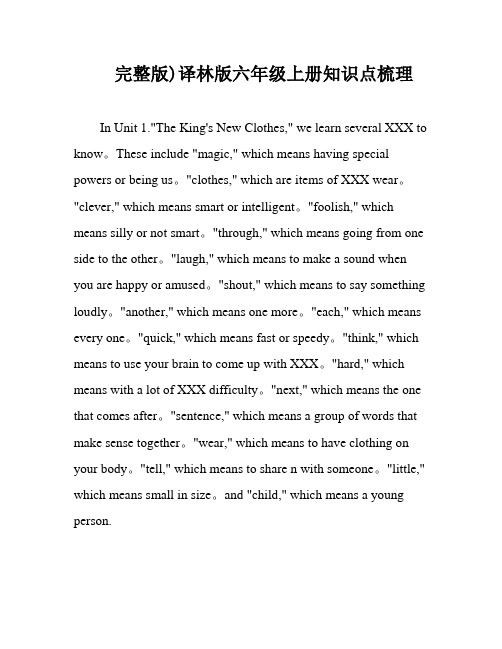
完整版)译林版六年级上册知识点梳理In Unit 1."The King's New Clothes," we learn several XXX to know。
These include "magic," which means having special powers or being us。
"clothes," which are items of XXX wear。
"clever," which means smart or intelligent。
"foolish," which means silly or not smart。
"through," which means going from one side to the other。
"laugh," which means to make a sound when you are happy or amused。
"shout," which means to say something loudly。
"another," which means one more。
"each," which means every one。
"quick," which means fast or speedy。
"think," which means to use your brain to come up with XXX。
"hard," which means with a lot of XXX difficulty。
"next," which means the one that comes after。
译林版六年级上册英语知识点汇总
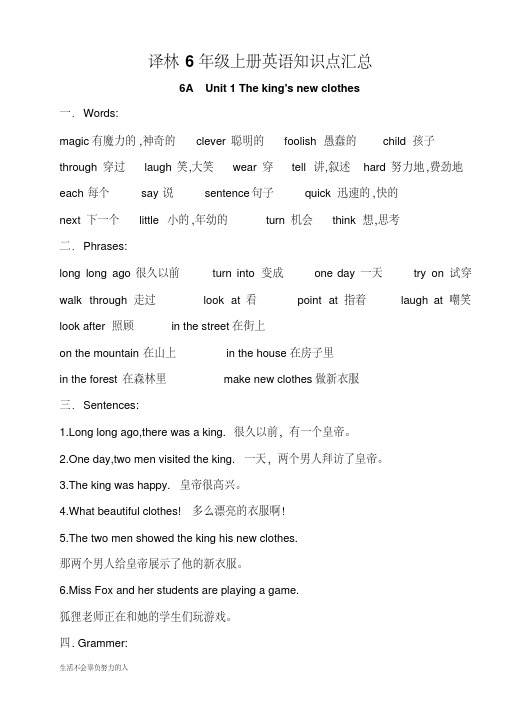
译林6年级上册英语知识点汇总6A Unit 1 The king's new clothes一.Words:magic有魔力的,神奇的clever 聪明的foolish 愚蠢的child 孩子through 穿过laugh 笑,大笑wear 穿tell 讲,叙述hard 努力地,费劲地each 每个say 说sentence 句子quick 迅速的,快的next 下一个little 小的,年幼的turn 机会think 想,思考二.Phrases:long long ago 很久以前turn into 变成one day 一天try on 试穿walk through 走过look at 看point at 指着laugh at 嘲笑look after 照顾in the street 在街上on the mountain 在山上in the house 在房子里in the forest 在森林里make new clothes 做新衣服三.Sentences:1.Long long ago,there was a king. 很久以前,有一个皇帝。
2.One day,two men visited the king. 一天,两个男人拜访了皇帝。
3.The king was happy. 皇帝很高兴。
4.What beautiful clothes! 多么漂亮的衣服啊!5.The two men showed the king his new clothes.那两个男人给皇帝展示了他的新衣服。
6.Miss Fox and her students are playing a game.狐狸老师正在和她的学生们玩游戏。
四. Grammer:1.概念在过去某个时间里发生的动作或存在的状态:过去习惯性或经常性的动作、行为。
2.时间状语…),in 1989,just ago,yesterday,the day before yesterday,last week(year,night,monthnow,long long ago,once upon a time.3.肯定句主语+行为动词(过去式)+其他。
- 1、下载文档前请自行甄别文档内容的完整性,平台不提供额外的编辑、内容补充、找答案等附加服务。
- 2、"仅部分预览"的文档,不可在线预览部分如存在完整性等问题,可反馈申请退款(可完整预览的文档不适用该条件!)。
- 3、如文档侵犯您的权益,请联系客服反馈,我们会尽快为您处理(人工客服工作时间:9:00-18:30)。
Unit 1 The King’s new clothes 一、词汇1.有魔力的magic2.聪明的clever3.想think4.愚蠢的foolish5.穿过through6.笑,大笑laugh7.穿wear8.讲,叙述tell9.每个each10.说say11.句子sentence12.迅速的,快的quick13.下一个next14.小的little15.机会turn16.努力地,费劲地hard17.孩子child (复数children)二、短语1.皇帝的新衣the king’s new clothes2. 某一天one day3. 拜访国王visit the king4.两个男子/女子two men/women5.穿过城市walk through the city6. 试穿try on7.这些魔法these magic clothes8.为你做新衣服make new clothes for you9. 在街上in the street10.给国王看他的新衣show the king his new clothes11.聪明的人clever people12.愚蠢的人foolish people13.看着国王look at the king14.穿着他的新衣in his new clothes / wear his new clothes15.一个小男孩a little boy16.指着国王point at/to the king17.非常合身fit well18. 今天下午this afternoon19. 一张来自我好友Mark的卡a card from my good friend Mark20. 来参加我的聚会come to my party21.在四点半at half past four22.在公园里in the park23.一个美国牛仔an American cowboy 24.穿着牛仔裤wear jeans25.一个苏格兰男士a Scottish man26. 穿一条苏格兰裙wear a kilt27. 讲故事tell a story28. 狐狸老师和她的学生们Miss Fox and her students29. 在山上on the mountain30.下一句the next sentence31.给男孩讲了一个故事tell the boy a story32.努力地想think hard33.不得不重新开始讲故事have to start the story again34.住在森林里live in the forest35. 生病了be sick/be ill36.在狮子的房子前面in front of the lion’s house37.在房子旁边散步walk by the house38.照顾他look after him39.愤怒的狮子the angry lion40.对着老人大喊shout at the old man41.把你的孩子给我give me your child =give your child to me42. 背诵课文recite the text43.和狮子住在一起live with the lion44.对她很好be nice to her45.变成一个王子turn into a prince三、句子1.很久以前,有个国王。
Long long ago, there was a king.2.那两个男人向国王展示了他的新衣服。
The two men showed the king his new clothes.3.国王穿着他的新衣服走过城市。
The king walked through the city in his new clothes.4.多么漂亮的衣服啊!What beautiful clothes! =How beautiful the clothes are!5.一个小男孩指着国王大笑,“哈哈!这国王没有穿任何衣服!”A little boy pointed at the king and laughed, ”Ha! Ha! The king isn’t wearing any clothes!”6.两个男人想要为国王做新衣服。
Two men wanted to make new clothes for the king.7.今天下午我从我的好朋友马克那里得到一张卡片。
This afternoon, I got a card from my good friend Mark. 8.四点半在公园来参加我的派对。
Come to my party at half past four in the park.9.每个学生说一个句子。
Each student says one sentence.10.在山上有座房子。
There was a house on the mountain.11.下一句是什么?What’s next? (What’s the next sentence?)12.狮子变成了一位王子。
The lion turned into a prince.13.女孩照顾了他。
The girl looked after him.14.狮子对她很好。
The lion was nice to her.15.你摘了一朵花。
You picked a flower.16.轮到Bobby了。
It is Bobby’s turn.Unit 2 What a day 一、单词1. sunny 晴朗的2. show 展览,展示3.interesting 有趣的4.weather 天气5.become 变成,变为6.windy 有风的7.cloudy 多云的8.high 在高处9.honey 蜂蜜10.drink 饮料11.ant 蚂蚁12.bee 蜜蜂13. cloud 云14.rain 下雨15.meet 遇见16. lose 丢失17.know 知道18.dumpling饺子19.rainy下雨的20.cloudy多云的21.wet湿的22.cheer欢呼23.lose丢失二、词组1.do the housework做家务2.climb up 爬上3.hold onto 抓紧4.fly away 飞走5.by bike骑自行车6.a parrot show 鹦鹉展7.in the sky 在天空中8.fly kites放风筝9.black clouds乌云10. all day整天11.go away走开12.well done干得好13.look sad开起来悲伤14.near the hill在小山附近15.have a picnic野餐16.watch a film看电影17.go swimming去游泳三、过去式(不规则)1.become—became变成[bɪ'keɪm]2.bring—brought带来[brɔːt]3.fly—flew 飞[fluː]4.go—went 去[went]5.see—saw 看见[sɔː]6.take—took拿,带[tʊk]7.eat—ate 吃[et; eit]8.do,does—did 做(行为动词),无意义(助动词)[dɪd]9.lose—lost 丢失[lɒst]10.find—found找到[faʊnd]11.have,has—had有[hæd]12. can --- could 能[ kʊd]13. get --- got得到[ɡɒt]14. make --- made 制作[meɪd]15. come --- came 来[keɪm]16. am, is --- was 是[wɒz]17. are --- were 是/wə, wɜː/18. tell --- told 告诉[təʊld]19. give --- gave 给[ɡeɪv]20. say --- said 说[sed]四、句子1.It was sunny and cloudy in the morning.早晨晴朗多云。
2.The weather became windy.天气变得有风了。
3.It rained in the afternoon.下午下雨了。
4.We saw many interesting parrots.我们看见许多有趣的鹦鹉。
5.We brought some dumplings, some bread and honey and some drinks.我们带了一些饺子、面包和蜂蜜,还带了些饮料。
6.What happened?出什么事了?7. What a day! 多么糟糕的一天!8. Sam wants to know why. 山姆想知道为什么。
(=Sam wants to know why he lost his new kite.)9. The kite flew high, but it flew too high and we couldn’t hold onto it.那风筝飞得很高,但太高了,我们抓不住它。
五、规则动词过去式变化规律1. 大多数动词后面直接加--ed,如:help --- helped, shout --- shouted, rain --- rained, play --- played;2. 结尾有不发音的e, 直接加--d,如:like --- liked, dance --- danced;3. 结尾是辅音字母加y结尾的,改y为i, 在加--ed,如:study --- studied, carry --- carried;4. 结尾时重读闭音节,而且末尾只有一个辅音时,双写这个辅音,再加--ed,如:stop --- stopped, chat --- chatted六、规则动词加ed之后的发音1. 清辅音(/p/、/ k/、/f/、/θ/、/s/、/ʃ/、/tʃ/)之后的ed念/ t/,cooked, watched, washed, laughed;2. 元音以及浊辅音(/b/、/g/、/v/、/ð/、/z/、/dʒ/、/m/、/n/、/ŋ/、/ ǀ/)之后的ed念/d/,showed, lived, played;3. 在/ t/、/d/之后的ed念/ɪd/,visited, needed.七、语法知识点1、(1)could引导的一般过去时的否定句,在could之后加not:could not=couldn’tSix years ago, I could write.(否定句) Six years ago, I couldn’t write.(2)could引导的一般过去时的一般问句,将could调至句首:Mike could read and draw.(一般问句) Could Mike read or draw?(3)could引导的特殊问句:特殊疑问句+could引导的一般问句:They could ride a bike. (对画线部分提问)Could they ride a bike (用do what替换) ?What could they do ?Unit 3 Holiday fun一、单词1.holiday 假日,假期2.call 打电话3. Bund (上海)外滩4.bottle 瓶子ke湖6.because因为7.main主要的8.Easter复活节9.Christmas圣诞节10.excited人激动11.exciting令人激动12.cool很棒的,酷13.ask问14.cousin 表堂兄弟姐妹15.invite邀请三、过去式1.catch ---caught2.hold--- held3. isn’t/ am not---- wasn’t4. aren’t --- weren’t5.wear--- wore6.don’t/ doesn’t --- didn’t四、句子1.你假期做了什么?我参观了上海博物馆。
